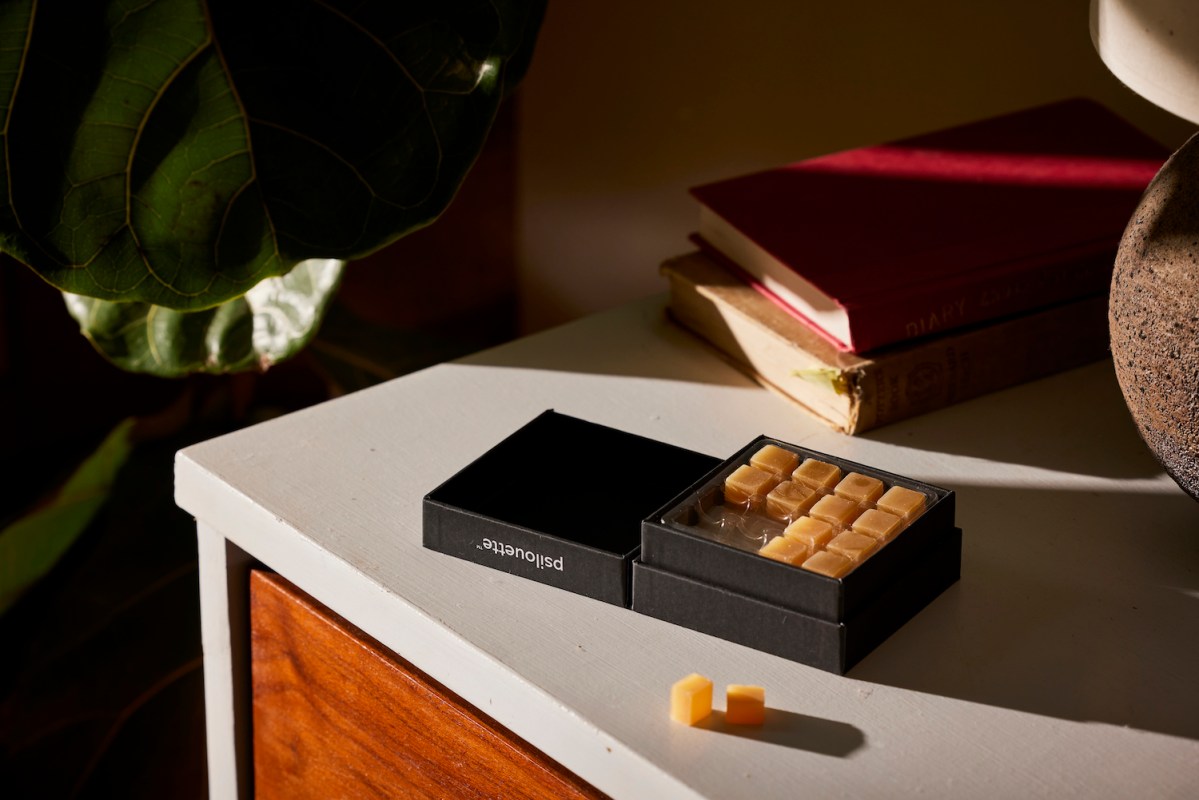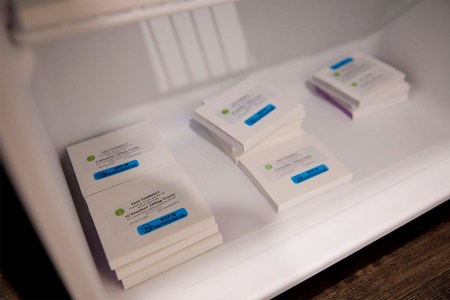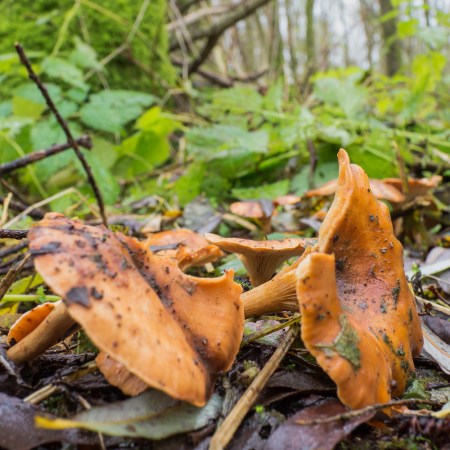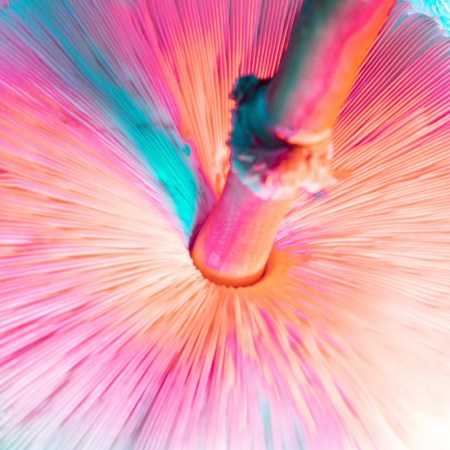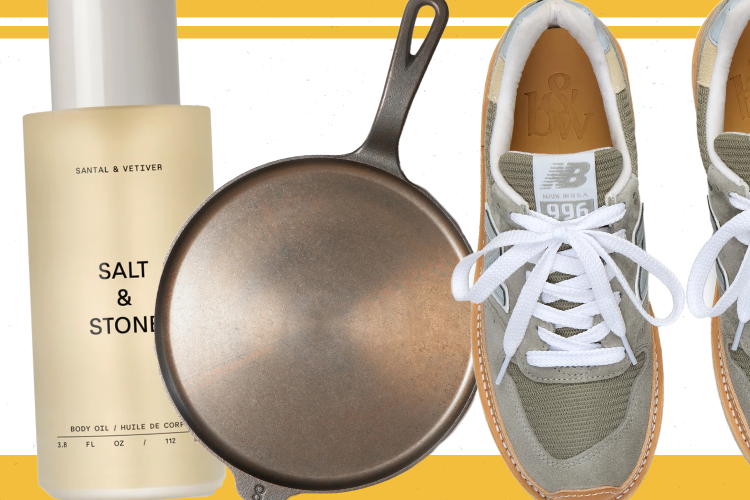During the past couple of years, it feels like there’s been more talk about psilocybin than there has been since the heyday of the hippies. Conde Nast Traveler named psychedelic immersions one of the top travel trends in 2023. States and cities are decriminalizing or outright legalizing the use of magic mushrooms, and there’s even a proposed timeline for legalization on the federal level. However, actually getting your hands on some mushrooms is often still the same story it’s always been: know a guy who knows a guy.
And then Psilouette came onto my radar. Started by Derek Chase, the founder of the cannabis company Flora + Bast, Psilouette makes gummies and teas with low doses of psilocybin. Customers place an order, they receive an invoice with a suggested donation amount (between $15 for the tea to $100 for the strongest gummies), and the product of choice is mailed to your door. I was skeptical that they’d have an effect at first, but it seemed far less sketchy than a bunch of dried shrooms in a beat-up plastic bag. And delightfully, they work. The gummies live up to the sleek branding and are far and away the most controlled experience imaginable.
Chase started making mushroom gummies about two and a half years ago. Previously, he worked corporate jobs at Johnson & Johnson and L’Oréal before getting into the cannabis industry. He had used mushrooms recreationally prior to launching his company, but it was the therapeutic side of mushrooms that drew him to start a commercial business.
“I had a brother who was diagnosed with schizophrenia at age 16 and had about 10 years in and out of the medical system until he eventually took his own life,” Chase says. “So a lot of the inspiration for our cannabis brand, and specifically Psilouette, is people who are struggling with mental illness that is so bad, they need to take measures like killing themselves.”
That inspiration, along with his own experiences with psilocybin, are at the core of Psilouette. “The long and short of it is, it got me out of the predicament I was in,” Chase says. “I would say I’m now somewhat in a better place in terms of my mental health.”
Psilouette is geared toward helping people improve their mental health, but not exclusively so. I, for one, was simply interested in the scalable dosing for chill long weekends and maybe a slight creativity boost — both of which the gummies provided, from the lowest dose to eating a handful.
Technically speaking, Psilouette is in the consultation business. The price covers the consultation with “gifted” psilocybin that’s paid for with a donation. It’s already seen success. Chase estimates he’s done a couple of hundred consultations and has hired more people to help with the volume. The five-minute talks that cover finding the right dose can stretch into hour-long calls that act as a sort of counseling session as people talk through their experiences and reasons for turning to Psilouette. And that’s without following the letter of the law.
In 2022, President Joe Biden announced he was planning for a legal pathway for the medical use of psilocybin in two years. Oregon, along with cities like Denver, has already opened the doors for local- and state-level legalization. Still, if cannabis operates in a legal gray area between state and federal laws, psilocybin is 50 shades of gray darker. Psilouette plans to sell in legal markets as they open up, possibly under a different brand name depending on the location. But online sales are currently the most accessible way for people who are interested.
“At the end of the day, if the DEA wants to crack down on us, whether we’re doing a gifting economy or a straight commercial purchase, they’re not going to treat us differently,” Chase says. “So we try to keep things as safe as possible, but for the most part we feel like our mission is stronger than the risk of me getting some jail time.”
The Microdose Debate: Gauging Effectiveness
The science is still out on microdosing. Some studies point to it just being a placebo effect. Other researchers note that it’s possible for psilocybin microdoses to have a therapeutic effect, especially because it’s thought that benefits happen gradually over time, according to the journal Nature. Part of the problem is that there simply isn’t a wide body of peer-reviewed research with a large sample size. Even if there were, there are a lot of variables to take into account, and each claim — from treating depression to ADHD to anxiety — would need to be studied independently. How much a person eats before consuming, the regularity of dosage over time and, importantly, the variable strengths of mushrooms themselves all complicate things further.
Despite the potential breakthrough status, there’s still a lot to learn about how psilocybin can help with mental health. Whereas Psilouette goes the microdose with consultation route, others stand by one large dose periodically, along with therapy.
“Traditional medications like Selective Serotonin Reuptake Inhibitors have serious side effects and limited efficacy,” says Ben Lightburn, co-founder and CEO of Filament Health, a clinical-stage psychedelic drug development company. “Psilocybin has shown significant promise for treating a range of mental health conditions. What surprises me is that there is still so much pushback from the government in both the U.S. and Canada, when the potential for healing is so great and the risks are so low.”
For some, regular microdosing could be an example of the expectancy effect, which is when people expect a daily dose of a drug to make them feel better, so they do in fact feel better. Then there’s the fact that “microdose” can mean different amounts for different people. Harvard Health lists that anything from a fifth to a 20th of a recreational dose counts.
One of the largest studies on microdosing included 191 participants and found that the benefits could be attributed to the placebo effect. Yet, that study had people supply their own drugs and put them into capsules, so there wasn’t a whole lot of control. There’s also the question of whether the wrong people are being studied — psilocybin could have different outcomes for mild versus serious anxiety or depression, for example. Another study compared the mood and mental health of 953 people who microdosed psilocybin to 180 people who didn’t for 30 days. It found “small to medium-sized improvements.”
“We don’t yet know enough about microdosing to scientifically assess its value,” Lightburn says. “Filament’s botanical psilocybin drug candidate is currently being studied in a microdose clinical trial at the University of Toronto, and we look forward to the results later this year. If the benefits of psilocybin can be had from a microdose, which doesn’t impact one’s ability to go about daily activities, this would be a huge development for patient access.”
Could Tripping on Ketamine in Your Pajamas Really Fix Your Mental Health?
Move over, antidepressants. Prescription “psychedelic kits” are poised to take over the industry.The Mushroom Wellness Moment
“In prior years, the public perception around the use of magic mushrooms has primarily centered around recreational use,” Justin Townsend, CEO of MycoMeditations, says. Townsend’s company runs psilocybin retreats in Jamaica that draw people from their late 30s to their early 70s — and for the vast majority of people, it’s their first time trying psychedelics. “These days, the use of psychedelics in a therapeutic capacity (psychedelic-assisted therapy) has now entered public perception as the dominant conversation piece, from mainstream media to private dinner parties, and is becoming part of the zeitgeist,” he adds.
Townsend credits Michael Pollan’s book How to Change Your Mind, the slow increase in published research and the FDA’s designation of psilocybin as having “breakthrough therapy status” as the main drivers of legitimizing psychedelic-assisted therapies. Psilocybin has been touted as a cure-all for all sorts of mental health issues: depression, anxiety, addiction, OCD, PTSD, ADHD — the list goes on.
“The timing of Covid and the result of the closures and fear-mongering pushed us over some sort of tipping point in regard to the mental health of the nation for anxiety and mental health disorders,” Chase says. “People are only dealing with more trauma and fewer and fewer options while the pharmaceutical world keeps doubling down in multiple prescriptions.”
Chase, it should be noted, is not a doctor. And regardless of how he feels about the current pharmaceutical environment, he advises people looking for an alternative to their medications to talk to their doctor first and to follow through with Psilouette’s consultations.
Easing Into Psilocybin With Psilouette
Psilouette measures its product in psilocybin weight rather than the dry weight of whole mushrooms for a consistent product. Taking dried mushrooms, on the other hand, can be a trial and error experience (though, it should be noted that mushrooms are considered one of, if not the, safest drugs to take recreationally). There can be a variance depending on the mushroom, making it even harder to measure exactly how much you’re taking. Think of it like the Wild West days of cannabis edibles, when a brownie could lead to a heavy high versus the more controlled and measured portions found in recreational states today.
Psilouette currently has two “moods” for its products in order to help drive intentional use. It’s something that Chase learned from cannabis budtenders: It can “enhance the experience by giving them an activity,” Chase explains. “It’s leading them down the right path simply by positioning the product.” The first mood is nootropic, which is intended to help with creativity. The second is aphrodisiac, which includes the purportedly arousing herb damiana.
Psilouette’s products are dosed low — something that experienced users might chafe at, but it’s proven helpful for those new to mushrooms. Chase notes about 95% of people who try Psilouette are new consumers. Each gummy of the nootropic and aphrodisiac options is dosed at 0.5 milligrams of active compounds derived from 75 milligrams of fruiting body mushroom. The average dose for women is one to two gummies, and two to four for men. Onset time is about 15 minutes, and the low level means it’s easy to scale up over time to reach the desired effect. The Acclimate line is dosed even lower to help people find the correct amount. All of the products are low enough that it puts finding the right level in the hands of the user.
Along with consistency, the gummy and tea format of pulverized fruiting body mushrooms makes it easier to digest. “I’m very sensitive with my gut, and every time I eat a raw mushroom, I want to throw up for the first hour,” Chase says. “It’s hard to have a therapeutic experience when you’re feeling ill.” He adds that “cooking the product lightly actually helps with digestibility, so there are much fewer incidences of nausea versus a chopped-up mushroom.”
When giving them a try, even at higher doses, Psilouette didn’t bring on the churning stomach that commonly comes with mushrooms. I didn’t try the tea, but Chase notes it has the same experience, and he is working on a sugar-free, 100% cacao bar as well.
This mushroom microdose moment that we’re in can feel wishy-washy. Psilouette is refreshingly straightforward. And that little box it’s delivered in is certainly more fun than anything in the pile of Amazon boxes that make it to your door.
The Charge will help you move better, think clearer and stay in the game longer. Subscribe to our wellness newsletter today.
